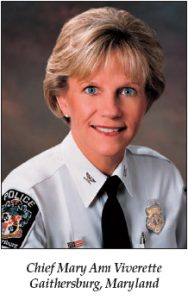 As I mentioned in my address in Miami, the police chief’s job is not an easy one. As law enforcement leaders, we have the responsibility to set and maintain the temperament of our respective organizations and the profession as a whole. Daily, we are confronted with an array of challenges, competing demands, and ever-changing community expectations that require our attention and response. Successfully overcoming these challenges is a daunting task which requires that we, as police chiefs, do all that we can to ensure that our officers and departments are properly trained, equipped, and prepared to protect the communities we serve.
As I mentioned in my address in Miami, the police chief’s job is not an easy one. As law enforcement leaders, we have the responsibility to set and maintain the temperament of our respective organizations and the profession as a whole. Daily, we are confronted with an array of challenges, competing demands, and ever-changing community expectations that require our attention and response. Successfully overcoming these challenges is a daunting task which requires that we, as police chiefs, do all that we can to ensure that our officers and departments are properly trained, equipped, and prepared to protect the communities we serve.
Unfortunately, in our desire to address the immediate needs of our agencies and communities, we sometimes fail to plan for the future leadership needs of our departments and our noble profession. This is a critical oversight, because we must realize that our success as police chiefs will be judged not only by what we accomplish today but also by how we prepare our agencies to confront the challenges of the future. It is vital that we, as law enforcement executives, take an active role in ensuring that our organizations have programs in place that systematically develop leaders so our organizations have leadership in depth and are continuously preparing leaders for the future.
It was the recognition of our collective responsibility to ensure that the next generation of law enforcement leaders are developed that led the IACP to launch its leadership training initiative in the 1990s. At the time, IACP leaders realized that developing a law enforcement leadership curriculum would be both a challenging and time-consuming project. But thanks to the steadfast commitment of my predecessors, I am pleased to announce that the IACP Center for Police Leadership has now been established at IACP headquarters.
The center is dedicated to assisting police chiefs and their agencies in their efforts to promote leadership at all levels. It serves as a central training and resource point for law enforcement agencies around the world, providing on-site training and technical assistance and developing police leadership publications of both an academic and practical nature. It is the IACP’s goal, through the work of the center, to provide quality leadership training at a reasonable price and to provide leadership-oriented information to police agencies in the United States and abroad.
The center’s curriculum has been built around the IACP’s comprehensive leadership development model, which was developed through a grant from the Office of Community Oriented Policing Services (COPS). The IACP model reflects documented best practices in the public and private sectors, the military, and the justice system. It is rooted in community oriented policing theory and addresses leadership as an agency-wide concept reaching all ranks and positions. In recognition of the diversity of police agencies and the communities they serve, the model is designed to be adaptable to an agency’s individual mission and philosophy. Even though the model is flexible, it has at its foundation a set of core values that reflect the nature of our profession: service, dignity, respect for others, honor, integrity, courage, loyalty, and duty.
The distinguishing feature of the IACP model is its focus on the systematic development of leaders at all levels of an organization- the concept of “every officer a leader.” A police organization can no longer rely on a single leader or a small group of leaders. In order to develop leaders, law enforcement executives must first create a culture in their organizations that is supportive of dispersed leadership. This means establishing expectations that officers will take leadership actions at their level of responsibility, and it means providing training, support, and rewards to those who do.
A key factor in the future success of the IACP Leadership Model is the institutionalization of its philosophy and goals in the law enforcement community. To accomplish this, beginning in 2006, the IACP Center for Police Leadership will be offering a comprehensive training course, Leadership in Police Organizations, on both an on-site and regional basis and a train-the-trainer course for agencies that wish to develop their own in-house leadership training capability. Initially, these courses will be offered in select areas, but it is anticipated that as the program expands, the training will be made available on a wider basis.
Additionally, copies of the course training manuals are currently available through McGraw-Hill Press. For additional information on the training program and details on how to obtain the course manual, please call Joel Leson, director of the IACP Center for Police Leadership, at 800-THE-IACP, extension 316.
The Center for Police Leadership is an ambitious and exciting undertaking for the IACP. It is a reflection of the critically important role that leadership development must play in a police chief’s daily efforts to manage his or her officers and department effectively. The center is also an affirmation of our commitment to ensure that law enforcement agencies will always be able to find the leaders they need to guide them through the challenges that confront them both now and in the future. I strongly encourage you to take advantage of this opportunity.


